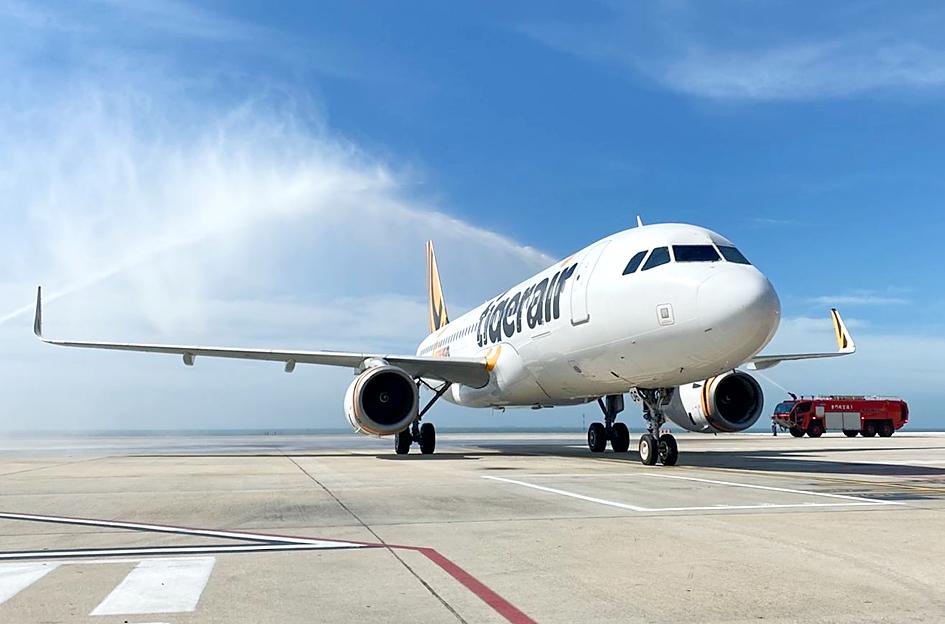Tigerair Taiwan Ltd (台灣虎航) is to issue 15 non-fungible tokens (NFTs) with each one set at a floor price of NT$150,000, the airline said in a statement yesterday.
In partnership with cryptocurrency exchange Maicoin Ltd (現代財富科技), the airline is to auction the 15 tokens from today to Thursday, allowing only Taiwanese to participate, the low-cost carrier said.
Consumers can purchase the tokens by credit card, it said.

Photo: Wu Cheng-ting, Taipei Times
The NFT issuance would be the first among Taiwanese airlines. The Ming Hwa Yuan Arts and Cultural Group (明華園戲劇總團) and Shiyun (師園) fried chicken shop issued NFTs in recent months.
Tigerair Taiwan is providing substantial perks to holders of its NFT tokens, such as allowing buyers to fly standby for free on any of its flights from July to the end of next year, it said.
“NFT buyers could get on a flight at the last minute if there is an unoccupied seat, although there is no guarantee of boarding when flying standby,” a Tigerair Taiwan official said in an interview with the Taipei Times.
Sometimes those who fly standby choose a different destination if they cannot get on their desired flight, but overall, it is an opportunity to save quite a bit of money, the official said.
Token buyers would also be eligible to take three complimentary trips on the airline’s new Airbus SE 320neo jets when the aircraft are delivered, the statement said.

SEMICONDUCTORS: The German laser and plasma generator company will expand its local services as its specialized offerings support Taiwan’s semiconductor industries Trumpf SE + Co KG, a global leader in supplying laser technology and plasma generators used in chip production, is expanding its investments in Taiwan in an effort to deeply integrate into the global semiconductor supply chain in the pursuit of growth. The company, headquartered in Ditzingen, Germany, has invested significantly in a newly inaugurated regional technical center for plasma generators in Taoyuan, its latest expansion in Taiwan after being engaged in various industries for more than 25 years. The center, the first of its kind Trumpf built outside Germany, aims to serve customers from Taiwan, Japan, Southeast Asia and South Korea,

Gasoline and diesel prices at domestic fuel stations are to fall NT$0.2 per liter this week, down for a second consecutive week, CPC Corp, Taiwan (台灣中油) and Formosa Petrochemical Corp (台塑石化) announced yesterday. Effective today, gasoline prices at CPC and Formosa stations are to drop to NT$26.4, NT$27.9 and NT$29.9 per liter for 92, 95 and 98-octane unleaded gasoline respectively, the companies said in separate statements. The price of premium diesel is to fall to NT$24.8 per liter at CPC stations and NT$24.6 at Formosa pumps, they said. The price adjustments came even as international crude oil prices rose last week, as traders

SIZE MATTERS: TSMC started phasing out 8-inch wafer production last year, while Samsung is more aggressively retiring 8-inch capacity, TrendForce said Chipmakers are expected to raise prices of 8-inch wafers by up to 20 percent this year on concern over supply constraints as major contract chipmakers Taiwan Semiconductor Manufacturing Co (TSMC, 台積電) and Samsung Electronics Co gradually retire less advanced wafer capacity, TrendForce Corp (集邦科技) said yesterday. It is the first significant across-the-board price hike since a global semiconductor correction in 2023, the Taipei-based market researcher said in a report. Global 8-inch wafer capacity slid 0.3 percent year-on-year last year, although 8-inch wafer prices still hovered at relatively stable levels throughout the year, TrendForce said. The downward trend is expected to continue this year,

Taiwan Semiconductor Manufacturing Co (TSMC, 台積電), which supplies advanced chips to Nvidia Corp and Apple Inc, yesterday reported NT$1.046 trillion (US$33.1 billion) in revenue for last quarter, driven by constantly strong demand for artificial intelligence (AI) chips, falling in the upper end of its forecast. Based on TSMC’s financial guidance, revenue would expand about 22 percent sequentially to the range from US$32.2 billion to US$33.4 billion during the final quarter of 2024, it told investors in October last year. Last year in total, revenue jumped 31.61 percent to NT$3.81 trillion, compared with NT$2.89 trillion generated in the year before, according to